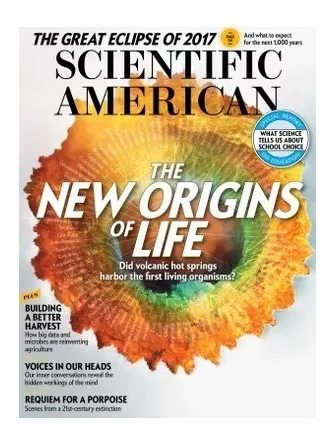Revista Scientific American Agosto 2017. Inglés
$29.500
Disponibilidad: 1 in stock
Revista Scientific American Agosto 2017. Inglés
ISSN: 0036-8733
Descripción
Life on Earth Came from a Hot Volcanic Pool, Not the Sea, New Evidence Suggests
Deep oceans were thought to hold life’s origins. New evidence points instead to an active volcanic landscape
It’s pitch-black. We have been scratching our way through dense underbrush in northwestern Australia, guided only by the dim light from a GPS screen. The light is too weak to reveal fallen trees that fill the dry creek bed we are following, and we keep tripping over them. We are two geologists working in a remote region of the country known as the Pilbara: Djokic up front and Van Kranendonk several steps behind. Our truck, parked somewhere on a small plateau, seems a world away. We are not sure if the GPS’s batteries will hold out long enough to show us the way back. The night sky, ablaze with countless stars visible right down to the horizon, twinkles in an amazing spectacle as Jupiter dances with nearby Venus. Sadly, this spectacle provides little navigational help for two scientists fumbling their way through the Australian outback in June 2014.
Goodbye, Vaquita: How Corruption and Poverty Doom Endangered Species
What the demise of a small Mexican porpoise tells us about extinction in the 21st century
Night is falling on the northern Sea of Cortez. It is eerily still. The terns and pelicans have gone to roost, and the dolphins no longer crisscross the water by the hundreds. The sea lions have hauled out for the evening. The usually temperamental water, the color of chocolate milk, is smooth as glass. Sundown is the best time to be on the upper Gulf of California, as the sea is also known, wedged against the Mexican desert, close to the U.S. border. The searing sun gives way to fantastic swaths of oranges, pinks and reds, painting the water with dancing shimmers of failing light.
Revista Scientific American Agosto 2017. Inglés
ISSN: 0036-8733
Descripción
Life on Earth Came from a Hot Volcanic Pool, Not the Sea, New Evidence Suggests
Deep oceans were thought to hold life’s origins. New evidence points instead to an active volcanic landscape
It’s pitch-black. We have been scratching our way through dense underbrush in northwestern Australia, guided only by the dim light from a GPS screen. The light is too weak to reveal fallen trees that fill the dry creek bed we are following, and we keep tripping over them. We are two geologists working in a remote region of the country known as the Pilbara: Djokic up front and Van Kranendonk several steps behind. Our truck, parked somewhere on a small plateau, seems a world away. We are not sure if the GPS’s batteries will hold out long enough to show us the way back. The night sky, ablaze with countless stars visible right down to the horizon, twinkles in an amazing spectacle as Jupiter dances with nearby Venus. Sadly, this spectacle provides little navigational help for two scientists fumbling their way through the Australian outback in June 2014.
Goodbye, Vaquita: How Corruption and Poverty Doom Endangered Species
What the demise of a small Mexican porpoise tells us about extinction in the 21st century
Night is falling on the northern Sea of Cortez. It is eerily still. The terns and pelicans have gone to roost, and the dolphins no longer crisscross the water by the hundreds. The sea lions have hauled out for the evening. The usually temperamental water, the color of chocolate milk, is smooth as glass. Sundown is the best time to be on the upper Gulf of California, as the sea is also known, wedged against the Mexican desert, close to the U.S. border. The searing sun gives way to fantastic swaths of oranges, pinks and reds, painting the water with dancing shimmers of failing light.
Related products
-
Libros, revistas y cómics
Revista Entrepreneur En Español – Marzo 2019
Rated 0 out of 5$35.000 Add to cart






